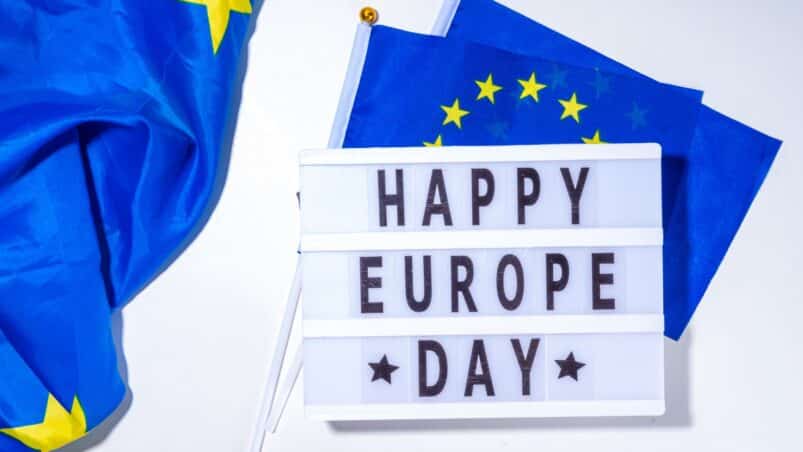On 9 May, dozens of events will be organised across the continent to celebrate Europe Day; an annual celebration to commemorate the formation of the EU and the values it represents, such as democracy, human rights, and solidarity. This year’s theme is “Europe is yours”, which emphasizes the need for all Europeans to be involved in finding ways to live together, and to use culture to bond with people of different backgrounds and make a difference for Europe.
The day is organised by the European Union, while the Europe Day Festival is powered by the European Cultural Foundation, which aims to develop and support cultural initiatives that let citizens share, experience and imagine Europe, to strengthen a European sense of belonging.
So why does it take place on 9 May? The date was chosen as it marks the anniversary of the Schuman Declaration, which was made on 9 May 1950 by the then-French Foreign Minister, Robert Schuman. The Schuman Declaration is considered to be a pivotal moment in European history as it proposed the creation of a European Coal and Steel Community, which eventually led to the formation of the European Union in 1993.
Events to participate
To celebrate this year’s theme, citizens can attend concerts, exhibitions, and lectures about European culture and values. EU institutions in Brussels, Luxembourg and Strasbourg also open their doors to the public so they can learn about the work of the EU.
Outside of EU institutes, there is plenty to discover as well at the Europe Day Festival. In Rosignano Monferrato (Italy) for example, visitors can discover more about the heritage of Ukrainian Embroidery Art, a symbol of the cultural identity of the Ukrainian people. Ukrainian culture is strongly represented this year, since in Brussels, you are able to join a conversation with key Ukrainian music professionals who are working on the frontline to provide humanitarian help. Afterwards, there will be a packed evening with concerts and performances.
No time to travel across Europe? No worries, as the website of Europe Day Festival 23 will be transformed into an ‘online streaming festival’. Running from 11:00 CEST till the evening hours you can enjoy real-time coverage of various Europe Day events and view original content as well as an exclusive selection of documentary films.
Debutants
There are also new initiatives present during Europe Day, such as the launch of the European Sentiment Compass: How Russia’s war against Ukraine challenges European culture and values. This annual study is a partnership initiative of the European Cultural Foundation (ECF) and the European Council on Foreign Relations (ECFR). The study analyses the European sentiment across all 27 EU member states a year since the start of Russia’s invasion of Ukraine.
Another event making its debut is Decolonial Europe Day, meant to bring together existing decolonising initiatives, civil society organisations and other actors around the common project of decolonising Europe, understood as an ongoing process. The online event will include nine sessions on the topics of decolonisation, anti-racism, justice, reparations, identity and much more.
Opportunity for heritage
While there are a few heritage-related activities, a day specifically dedicated to European values and history would be an excellent opportunity for the heritage sector to showcase itself. Other successful celebrations of European culture, such as the European Heritage Days, already show that European citizens are very much interested in getting to know more about local heritage.
Connecting heritage-related events to Europe Day would be an excellent fit to show the European dimension of many heritage sites and practices. Think for example of important sites in the history of the European Union, such as the European Heritage Label sites. Or workshop on heritage practices and traditional crafts. Heritage would fit right into the sense of representing European values and a sense of belonging.

